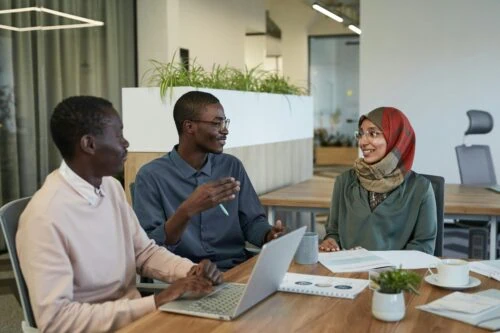Welcome to the fascinating world of cultural diversity! Whether you’re just starting your career journey or looking to broaden your understanding of the global workplace, understanding different cultures around the world is critical to navigating today’s interconnected environment.
This guide offers a peek into various cultural practices and perspectives. We’ll explore how these diverse cultures contribute to creativity and innovation in the workplace, enhance social relationships, and promote a more inclusive society. Understanding and embracing cultural diversity can improve your interpersonal skills, enhance your career prospects, and contribute positively to any team.
Get ready to dive into a journey that will expand your horizons and enrich your professional life!
Understanding Different Cultures Around the World
Exploring different cultures around the world is fascinating and essential in our interconnected global society. Learning about diverse cultural practices cultivates mutual respect and understanding, paving the way for smoother interactions and cooperation across borders.
Significance of Cultural Knowledge
Awareness of cultural differences and similarities can impact various aspects of life, including business, education, and personal relationships. Here are a few reasons why understanding different cultures is essential:
- Enhances Communication: Knowing cultural nuances can improve interactions and prevent misunderstandings.
- Promotes Inclusion: People who understand and respect different cultures are more likely to create inclusive environments.
- Spurs Personal Growth: Exposure to diverse cultures broadens one’s perspective and fosters empathy.
Tools for Cultural Understanding
There are many resources available that can help individuals learn about different cultures. Some helpful tools include:
- Educational Websites: Platforms like the Smithsonian Institution offer insights into the history and culture of various communities around the globe.
- Cultural Exchange Programs: Participating in programs like the U.S. Department of State’s Exchange Programs can provide firsthand experience of other cultures.
- Local Cultural Events: Attending events hosted by cultural centers or communities provides an immersive experience.
Furthermore, initiatives like these demonstrate the value of learning and understanding different cultures around the world, promoting a more harmonious global environment. As we continue to learn and adapt, we ensure a richer, more diverse society.
The Importance of Cultural Diversity
Cultural diversity is pivotal in shaping vibrant, innovative, and resilient communities. Embracing various cultural perspectives enriches our understanding and enhances societal progress.
Benefits in the Workplace and Beyond
Diverse cultural backgrounds bring unique viewpoints and skills, effectively boosting creativity and problem-solving capabilities in any group setting:
- Innovation: Diverse teams are often more innovative, drawing upon various ideas inspired by differing cultural experiences.
- Increased empathy: Regular interaction with different cultures fosters empathy and reduces biases.
Advancing Social Justice
Cultural diversity is crucial for advancing social justice. It helps to dismantle systemic barriers faced by underrepresented groups, promoting fairness and equality. Engaging with stories and struggles around the world enlightens us about the realities others face and energizes movements toward more significant equity. For instance, observing UNESCO’s World Day for Cultural Diversity for Dialogue and Development helps raise awareness and promotes diversity as a development driver.
Educational Impact
Education systems incorporating cultural diversity expose students to global perspectives, preparing them to operate in a worldwide economy. Universities often emphasize the importance of such global exposure, as seen through the wide range of international programs offered by institutions like Penn Global.
Ultimately, cultural diversity enriches our communities and workplaces, opening doors to new opportunities and driving us toward a more just and interconnected world.
Common Cultural Practices in Different Regions
As we explore different cultures around the world, we discover that cultural practices vary greatly and are deeply rooted in historical and social contexts.
Asia: Community and Tradition
In many Asian countries, community-focused values are predominant. Family gatherings and collective activities reinforce these societal norms:
- Festivals such as Diwali in India highlight the importance of traditional practices and family.
- In Japan, respect and politeness are integral parts of daily interaction.
Europe: Historical Influence and Modernity
European cultures blend deep historical roots with contemporary practices, creating a unique cultural tapestry:
- Spain’s Flamenco and Italy’s Opera showcase traditional arts that continue to evolve.
- Nordic countries focus on simplicity and functionality, which influence their design and lifestyle.
Africa: Diversity and Rich Heritage
African cultures are diverse, each with distinct languages, arts, and social structures:
- Music and dance are vital in communal life across many African societies.
- Markets, serving as social and economic hubs, are common in places like Morocco and Ghana.
The Americas: Melting Pot of Cultures
In North and South America, Indigenous, European, African, and Asian influences merge to form vibrant cultural landscapes:
- Festivals like Carnival in Brazil or Thanksgiving in the USA reflect a blend of various cultural influences.
Understanding standard cultural practices in different regions enhances our appreciation for diversity and guides effective interactions with global communities.
Challenges Faced By Different Cultures
Different cultures around the world encounter numerous challenges that impact their preservation and evolution.
Globalization and Cultural Homogenization
As the world becomes more interconnected, smaller cultures often struggle to maintain their unique identities:
- Global media can overshadow local customs, leading to diminished cultural practices.
- Younger generations might gravitate towards global trends, neglecting traditional customs.
Language Endangerment
Language is a core element of culture, yet many languages are at risk of disappearing:
- The United Nations reports that a language dies with its last speaker every two weeks.
- This loss affects not just communication but also heritage and ancestral knowledge.
Initiatives like UNESCO’s Endangered Languages Program aim to preserve these critical cultural components.
Economic and Social Barriers
Economic disparities and social instability pose significant threats to cultural preservation:
- Poverty can limit the resources available for cultural events and education.
- Social unrest often disrupts the transmission of cultural norms.
Cultural Misunderstandings and Conflicts
Misinterpretations between different cultural groups can lead to conflicts, affecting social harmony and integration:
- Even well-intentioned actions can be misread due to cultural differences.
- Efforts to increase cultural sensitivity and communication are essential for mitigating these issues.
While these challenges are significant, understanding and addressing them is crucial for fostering a more inclusive global community.
Benefits of Embracing Cultural Diversity
Cultural diversity enriches societies by broadening perspectives and promoting innovation in various domains.
Economic Growth
Diverse societies often experience enhanced economic performance:
- Multicultural teams boost creativity and problem-solving, leading to better business outcomes.
- Diversity attracts talent and investment, driving economic growth.
Social Cohesion
Inclusivity in cultural practices promotes understanding and reduces conflicts:
- Community events that celebrate various cultures improve relationships among neighbors.
- Schools with inclusive curricula encourage respect among students from a young age.
Innovation and Creativity
Interaction among different cultures stimulates new ideas and innovations:
- Collaborations across cultural lines have resulted in breakthroughs in technology and arts.
- Cultural diversity leads to diverse problem-solving approaches, which can be crucial in research and development.
Improved Healthcare Outcomes
Understanding cultural differences improves healthcare delivery and patient satisfaction:
- Culturally competent healthcare practices enhance patient trust and care effectiveness.
- Initiatives like the CDC’s Office of Minority Health & Health Equity emphasize the importance of cultural competence.
Embracing cultural diversity builds a more vibrant and cooperative society and enhances the quality of life for all members.
Cultural Diversity in the Workplace
Workplace cultural diversity offers various benefits that contribute to a company’s success and employee satisfaction.
Enhancing Team Performance
Diverse teams are more effective, bringing a variety of perspectives that lead to innovative solutions:
- Employees from different cultural backgrounds can offer unique insights and approaches to problem-solving.
- This diversity drives creativity and innovation, which are vital for staying competitive.
Attracting and Retaining Talent
Workplaces that celebrate diversity are more attractive to potential employees and tend to have higher retention rates:
- A culture that values diversity draws talent from a broader pool, ensuring the best candidates are selected.
- Inclusive environments reduce employee turnover by promoting a sense of belonging and satisfaction.
Improving Global Business Interactions
Companies with a culturally diverse workforce are better equipped to handle international clients and markets:
- Employees who understand different cultural norms and languages facilitate smoother international business dealings.
- This capacity can lead to expanding business relationships and pursuing new market opportunities.
Cultivating cultural diversity in the workplace is an ethical imperative and a business strategy that promotes long-term growth and stability.
How Different Cultures Contribute to Society
Different cultures around the world contribute uniquely to the global society, enriching it in various dimensions.
Cultural Contributions to Arts and Humanities
The arts and humanities gain immense richness from the contributions of diverse cultures:
- Music, literature, and art from different cultures expose us to new narratives and aesthetic styles.
- Events like film festivals often showcase this diversity, providing a platform for cultural expression and appreciation.
Technological and Scientific Innovation
Cultural perspectives can significantly influence innovative thinking in science and technology:
- Insights from indigenous knowledge have led to advances in botany and ecology.
- Global collaborations in research arenas bring together diverse problem-solving approaches.
Cultural Diversity in Education
Educational institutions that integrate cultural diversity prepare students to thrive in a globalized environment:
- Curriculums that include multiple cultural perspectives promote critical thinking and empathy among students.
- This broadened worldview equips students with the skills necessary to succeed in any multicultural setting.
The contributions of different cultures are essential. They enhance our daily experience and advance societal development in comprehensive ways.
Promoting Cultural Understanding and Respect
Encouraging respect and understanding for different cultures is crucial for building a harmonious global society.
Education and Awareness
Education plays a vital role in promoting cultural understanding:
- Schools implementing multicultural curriculums help students appreciate different cultures from an early age.
- Universities often hold cultural awareness events that encourage student engagement and learning.
Media Representation
Media has the power to shape perceptions and promote diversity:
- Inclusive media representation helps normalize intercultural exchanges and reduce stereotypes.
- Documentaries and films exploring different cultures provide insights into their values and lifestyles.
Community Engagement
Active participation in community events can promote cultural understanding:
- Community centers often hold cultural festivals where people can experience traditions hands-on.
- Workshops and talks on cultural topics educate and enlighten community members.
Promoting a deeper understanding and respect for different cultures through these efforts enhances community cohesion and individual relationships worldwide.
FAQs
What is cultural diversity?
Cultural diversity refers to the variety of cultures in the world, each with its own beliefs, practices, and traditions.
Why is cultural diversity important?
It enriches societies, promotes creativity, and fosters mutual respect and understanding among communities.
How can individuals promote cultural respect?
They should educate themselves about different cultures, participate in cultural events, and practice open and respectful communication.
What are some ways to learn about different cultures?
Learning through travel, attending cultural festivals, reading books about different cultures, and watching culturally diverse films is a great way to broaden your horizons.
How can workplaces benefit from cultural diversity?
Culturally diverse teams are more innovative and can better connect with global markets, enhancing competitiveness and profitability.
Can understanding different cultures help prevent conflicts?
Yes, knowing the cultural backgrounds and perspectives of others can reduce misunderstandings and promote peaceful coexistence.
Conclusion
Exploring different cultures around the world enhances our understanding and enriches our professional and personal lives. We foster a more inclusive, innovative, and cooperative global society by embracing cultural diversity.
Join the Movement
Commit to promoting and celebrating diversity in all areas of life. Join Diversity Employment and create a profile today! Be part of a community that values diversity inclusion positions and practices inclusion. Together, we can significantly impact, creating a more diverse and unified world.
Let’s continue to learn, share, and grow together, appreciating the rich cultural tapestry that different communities around the world bring to our collective table.




